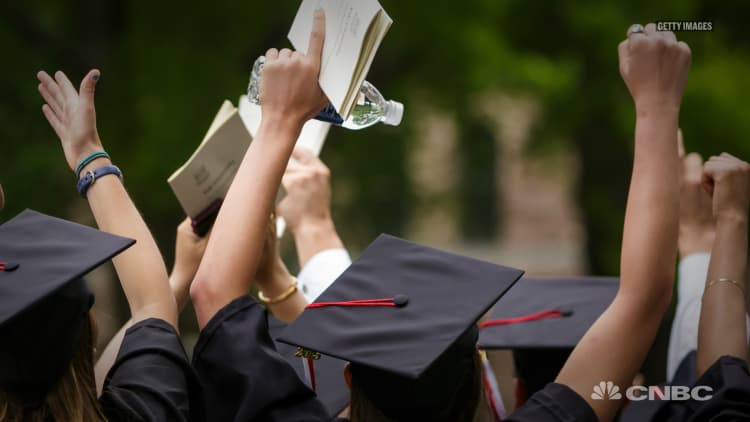On Tuesday, federal prosecutors brought charges against 50 people in a college cheating scandal wherein wealthy parents paid around $25 million to help their students gain admittance into exclusive colleges and universities including Yale, Stanford and Georgetown.
According to the Justice Department, William Rick Singer, founder of college counseling organization Edge College & Career Network, helped students cheat on SAT and ACT exams, bribed athletic coaches and administrators to pretend that students were athletic recruits and used a charity he had established to funnel the funds.
The scandal has put on a spotlight on the debate around the supposed meritocracy of higher education admissions and raised questions about the legal yet unethical ways in which wealthy families are given an advantages by elite schools.
Hafeez Lakhani is the founder and president of academic coaching firm Lakhani Coaching. Lakhani says he earned a perfect SAT score, went to Yale, worked for Morgan Stanley, and now charges as much as $1,000 an hour for his personal college preparatory services.
Lakhani says that while the scandal has understandably shocked many, Americans may be overlooking an unexpected dimension of it.
"Selective universities, even those with the narrowest funnels, painstakingly admit a wide range of constituents, some of which overlap — students from public school, private school, first generation students, students of various regional and class backgrounds, recruited athletes, etc.," he tells CNBC Make It.
"If there is a silver lining to the scandal," Lakhani says, "it's that even perfectly legitimate elite admissions coaching mostly helps students compete for those spots that would be carved out for students with privilege — the private school set, for instance — and doesn't cannibalize spots that would go to public school or lower income candidates."
Lakhani says that college admissions counselors work hard to create a diverse classes of students and reserve spots for students of all kinds of background so that, at the end of the day, wealthy private-school of kids are primarily competing against one another.
"The bar is higher for people applying from these places of privilege than it is for everyone else," he says, "and maybe that could help people feel a little bit better about it, right? Like, hey, they have all these resources, but actually the bar is higher. People who are coached and and have that level of preparation are not stealing spots away from [students who require] financial aid. Which, frankly, I'm really happy about."
Richard V. Reeves, senior fellow of Economic Studies and co-director of the Center on Children and Families at the Brookings Institute, says that Lakhani's argument misses the bigger picture.
Legitimate elite admissions coaching mostly helps students compete for those spots that would be carved out for students with privilege.Hafeez Lakhanifounder, Lakhani Coaching
"It's an argument that's made a lot about these sorts of things: If I, as an elite parent, make some investments, I game the system and it gets my kid in, it's not as if I'm denying a poor Hispanic kid from Texas — I'm denying my neighbor, another white affluent kind of kid." he tells CNBC Make It. "But if something's unfair, it's unfair even if it only happens once and even if it only affects one person. And it's unfair even if it kicks off somebody else who may not be disadvantaged. I think that the long-run effects of all this is almost certainly to privilege those who have even more money."
Reeves, who is the author of "Dream Hoarders," says arguments like Lakhani's rationalize unethical behavior.
"I think that's a really terrible defense to just say, 'Yes, it's unfair, but it's just affecting other wealthy people,'" he says. "What it does is it normalizes the idea that you can game the system or buy by the system."
Sara Goldrick-Rab, professor at Temple University, author of "Paying the Price " and founder of the Hope Center for College, Community and Justice tells CNBC Make It says that this kind of arms race among elite students and their families has a negative impact on students who are unable to afford college coaching services.
"The very nature of that competition where the wealthy are sort of one-upping each other, to have the more perfect college application, leaves the others applicants not looking as good," she says.
"The middle class is really hurt here, because enrolling them does virtually nothing for these schools. They neither get points for having low-income students — because these middle class people don't get Pell [Grants] — nor did they get the advantages of [enrolling wealthy students.] If they have these tutors, and they take the SAT a number of times, and they visit all these campuses and try to get the perfect interviews, these families can decimate their savings."
Both Reeves and Goldrick-Rab recommend that colleges consider a lottery system that takes factors like gender and income into consideration, in order to build admissions systems that are less confusing and more fair.
"Complexity is the friend of the upper class," says Reeves. "Simplicity is the friend of the middle class and the working class, who are currently having to navigate an unbelievably complex system that is like a Byzantine bureaucracy."
Like this story? Subscribe to CNBC Make It on YouTube!
Don't miss:




